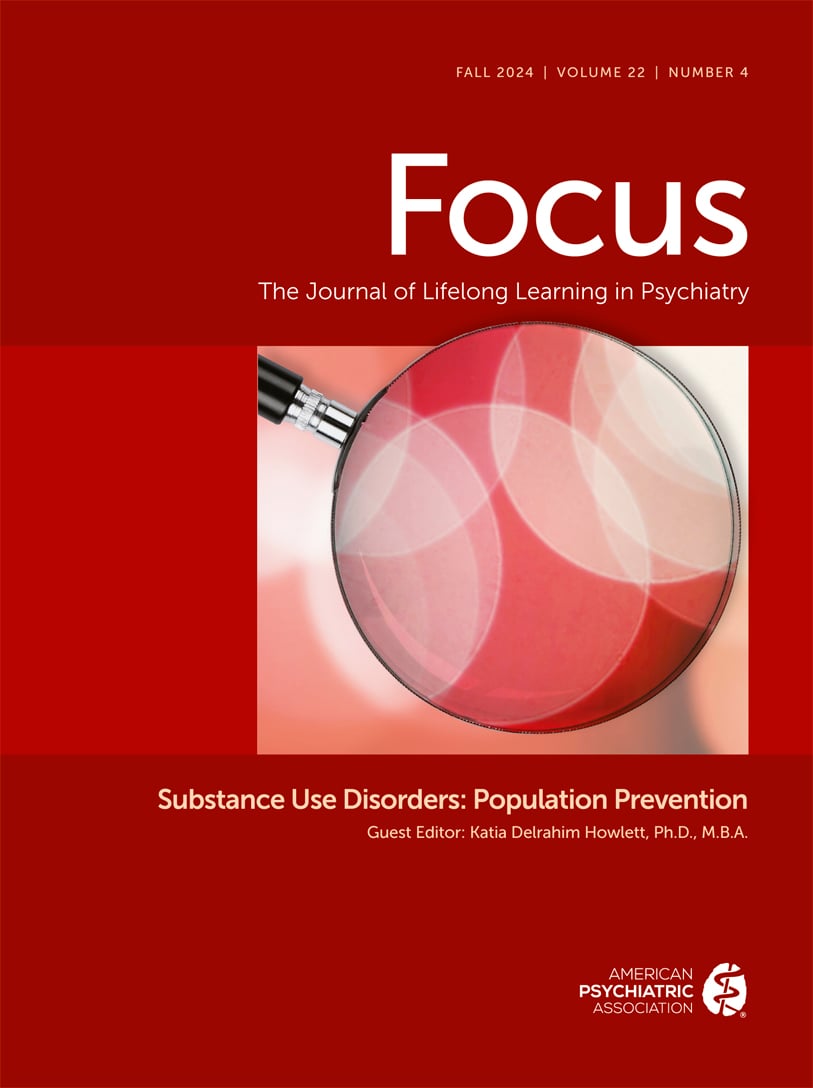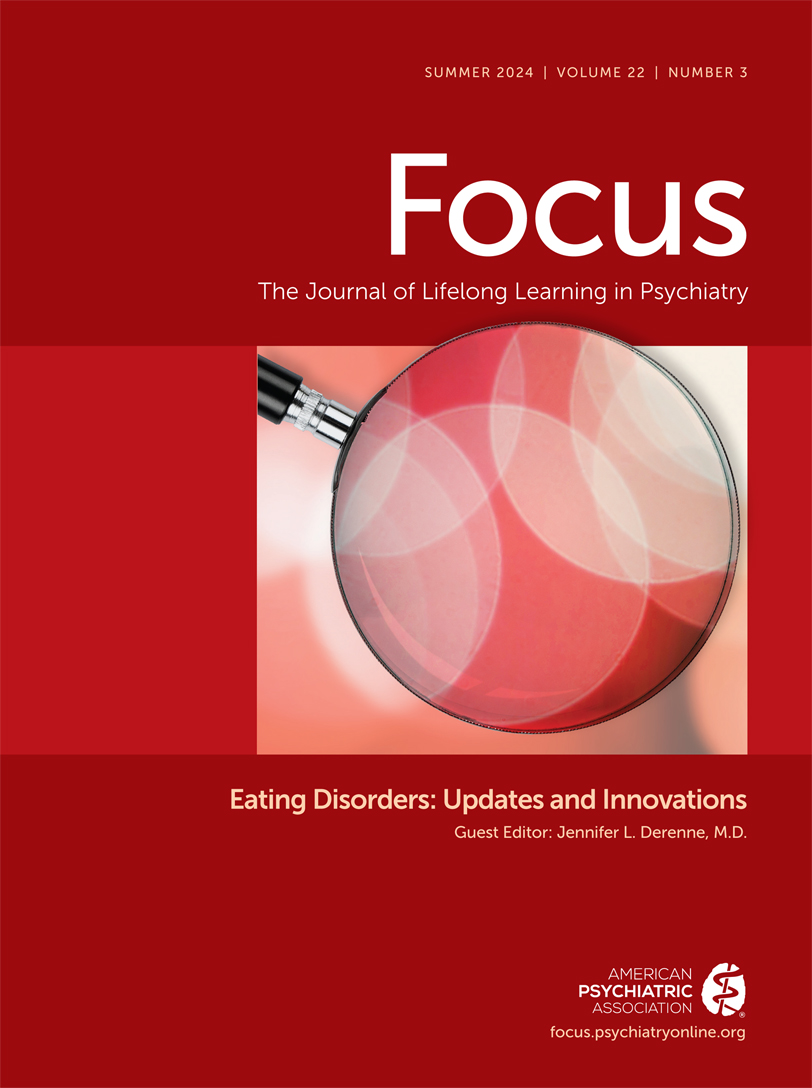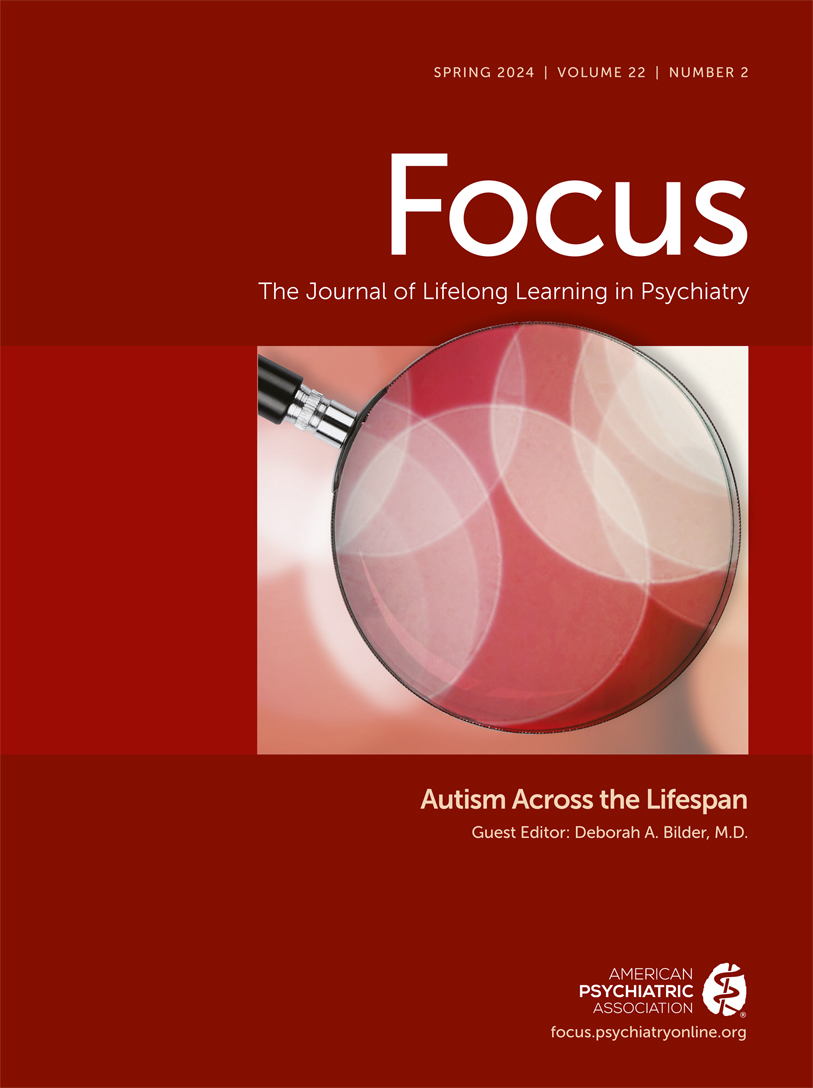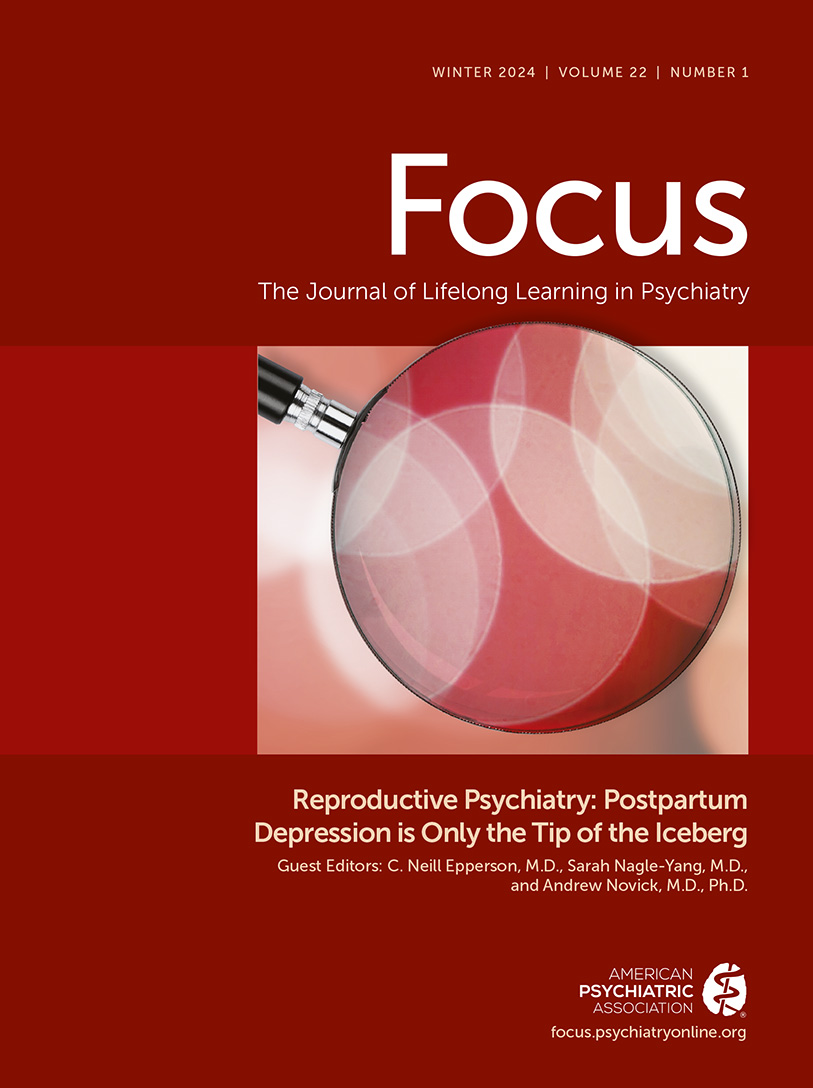Focus
- Volume 19
- Number 1
- January 2021
From the Guest Editor
Review
Publication date: 01 January 2021
Pages3–13The beliefs that antipsychotic drugs (APDs) are 1) effective only to treat delusions and hallucinations (positive symptoms), 2) that typical and atypical APDs differ only in ability to cause extrapyramidal side effects, and 3) that their efficacy as ...
https://doi.org/10.1176/appi.focus.20200051Clinical Synthesis
Publication date: 01 January 2021
Pages14–23Tardive dyskinesia (TD) is a debilitating, iatrogenic, and potentially severe movement disorder characterized by involuntary, repetitive, purposeless movements that are present throughout the body. The authors present a review of studies of past, current, ...
https://doi.org/10.1176/appi.focus.20200038Publication date: 01 January 2021
Pages24–30The early mortality of individuals with serious mental illness has long been documented yet persists despite calls for change. Individuals with serious mental illness have a higher rate of medical morbidity than those in the general population across all ...
https://doi.org/10.1176/appi.focus.20200036Publication date: 01 January 2021
Pages31–38Attention-deficit hyperactivity disorder (ADHD) is the most commonly diagnosed psychiatric disorder in children and adolescents in the United States. In 2016, approximately 3.8 million U.S. children ages 2 to 17 years with ADHD were being treated with ...
https://doi.org/10.1176/appi.focus.20200032Publication date: 01 January 2021
Pages39–45Hypoactive sexual desire disorder (HSDD) is a persistent or recurrent absence of sexual fantasies and desire for sexual activity, causing marked personal distress or interpersonal difficulties. HSDD affects 10% of U.S. women and is associated with ...
https://doi.org/10.1176/appi.focus.20200039Publication date: 01 January 2021
Pages46–49Medications available to treat psychiatric illnesses continue to increase, in conjunction with a shifting of outpatient psychiatric practice from psychotherapy toward medication management. To be successful in this climate, a psychiatrist needs to select ...
https://doi.org/10.1176/appi.focus.20200037Ask the Expert
Ethics Commentary
21st-Century Psychiatrist
Publication date: 01 January 2021
Pages59–60During a pandemic, physicians can become so inundated with combating the disease that they may forget the individual patient’s experience. In this perspective, the authors describe a case of COVID-19 from the point of view of the grief stages (or ...
https://doi.org/10.1176/appi.focus.20200033Publication date: 01 January 2021
Pages61–65This article highlights one department’s efforts to bolster diversity, equity, and inclusion as an exemplar for other academic departments. It offers an approach for building an infrastructure and leadership group and details accomplishments associated ...
https://doi.org/10.1176/appi.focus.20200024Applied Armamentarium
Publication date: 01 January 2021
Pages66–70Clozapine is a second-generation antipsychotic with a superior efficacy for the management of treatment-resistant schizophrenia but underutilized because of potential side effects. A 59-year-old Caucasian male veteran was transferred from the long-term ...
https://doi.org/10.1176/appi.focus.20200029Bibliography
Abstracts
Influential Publication
Publication date: 01 January 2021
Pages76–85Objective: Evaluate the clinical utility of combinatorial pharmacogenomic testing for informing medication selection among older adults who have experienced antidepressant medication failure for major depressive disorder (MDD). Design: Post hoc analysis of ...
https://doi.org/10.1176/appi.focus.19107Publication date: 01 January 2021
Pages86–94Importance: Randomized controlled trials have demonstrated increased all-cause mortality in elderly patients with dementia treated with newer antipsychotics. It is unknown whether this risk generalizes to non-elderly adults using newer antipsychotics as ...
https://doi.org/10.1176/appi.focus.19101Publication date: 01 January 2021
Pages95–115Objective: The authors provide an evidenced-based summary of the literature on the clinical application of psychedelic drugs in psychiatric disorders. Methods: Searches of PubMed and PsycINFO via Ovid were conducted for articles in English, in peer-reviewed ...
https://doi.org/10.1176/appi.focus.19104Publication date: 01 January 2021
Pages116–128We summarized and compared meta-analyses of pharmacological and non-pharmacological interventions targeting physical health outcomes among people with schizophrenia spectrum disorders. Major databases were searched until June 1, 2018. Of 3,709 search ...
https://doi.org/10.1176/appi.focus.19103Publication date: 01 January 2021
Pages129–137Background: Although mania and hypomania define bipolar disorder, depressive episodes are more common and impairing, with few proven treatments. Adjunctive therapy with second-generation antidepressants is widely used to treat acute bipolar depression, but ...
https://doi.org/10.1176/appi.focus.19102Past Issues
View Issues Archive
Vol. 22 | No. 4

Vol. 22 | No. 3

Vol. 22 | No. 2
